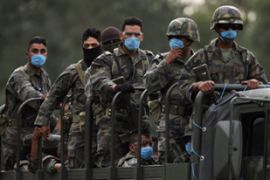WHO raises swine flu alert level
UN body says virus can be transmitted between humans, but is not yet a pandemic.

| In depth |
|
|
“The situation is fluid and the situation continues to evolve.”
Sandra Mournier-Jack, a lecturer in health policy at the London School of Hygiene and Tropical Medicine, told Al Jazeera that people should avoid panicking over the new alert level.
“We should be, in a way, more alarmed, but at the same time we shouldn’t panic because there are a lot of things we don’t know about this disease at the moment,” she said.
“What is that fatality rate? We don’t really know that. It could be as much as two per cent of people catching the disease, but it could be a lot less than that.”
Virus spreads
Besides Mexico, swine flu cases have been reported in the United States, Canada and Europe.
The US has confirmed 40 cases, with 20 new cases from a New York school where students had returned from a school trip.
|
Follow Al Jazeera’s Mexico correspondent on Twitter:
|
In the UK, authorities said two people in Scotland had tested positive for swine flu infection and were being treated in isolation in a hospital near Glasgow, although both were said to be “recovering well”.
Only Mexico has reported deaths from the virus.
Countries across the world are acting to halt the spread of the new strain, apparently a mix of human, pig and bird viruses.
Mexico closed all schools across the country until May 6 as a precaution. Schools had already been closed in Mexico City and in five of Mexico’s 32 states.
The US government declared a public health emergency and advised against non-essential travel to Mexico, a call echoed by Androulla Vassiliou, the European Union’s health chief.
Barack Obama, the US president, said that officials are closely monitoring the cases of swine flu in the country.
“This is obviously a cause for concern and requires a heightened state of alert. But it is not a cause for alarm,” he said.
Preventative measures
| Swine flu: At a glance |
|
|
People are also being tested for suspected cases in France, Italy, Sweden and Switzerland.
Other suspected cases are being investigated in Brazil, New Zealand and Israel.
Russia, Hong Kong and Taiwan have said travellers returning from flu-affected areas who displayed symptoms of fever would be quarantined.
Several countries have also banned imports of pork and pork products from Mexico and the three US states reporting cases of swine flu, although scientists say the disease would not be contracted by eating pork meat.
New Zealand, Israel and several other countries have implemented new security measures at airports and are putting sick visitors under observation.
Despite the raised alert level, the WHO has recommended countries not close their borders or restrict international travel.
Should swine flu escalate into a pandemic, the world is thought to be better prepared to cope with it than it has been with other viruses in the past.
After the outbreak of Severe Acute Respiratory Syndrome (Sars) in 2003, which killed nearly 800 people, and amid regular reported cases of bird flu, countries have stepped up preparations against a pandemic, including stockpiling anti-viral drugs.

 Q&A: What is swine flu?
Q&A: What is swine flu?
